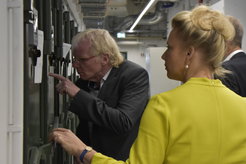“Findings on catalysis attract international attention”
Science Minister Ina Brandes visits the Max-Planck-Institut für Kohlenforschung
What are the scientists at the Max-Planck-Institut für Kohlenforschung in Mülheim an der Ruhr currently working on? What's new on the campus? Ina Brandes, science minister of the state of North Rhine-Westphalia, has now paid a visit to the institute. In the process, she gained exciting insights into the day-to-day research of the historically rich institution, which today employs around 400 people from nearly 40 countries.

"We deal with all aspects of catalysis research," said Prof. Ferdi Schüth, executive director of the institute. He explained why catalysis is such an important key technology, also for North Rhine-Westphalia. Researchers at the institute are involved, for example, when it comes to the chemical storage of hydrogen or finding out how to chemically bind solar energy. These are elementary questions when it comes to the future of the energy industry. But catalysis is also crucial for most reactions in the chemical industry and for the production of pharmaceuticals.
Ina Brandes: "In North Rhine-Westphalia, world-renowned researchers find an optimal environment for their scientific work. The findings on catalysis, for example, that are being obtained here are attracting international attention. I am particularly pleased that awards such as the Nobel Prize in Chemistry for Benjamin List two years ago attract many young scientists, making North Rhine-Westphalia the home of top-level research."
The minister also had the opportunity to take a look at various departments at the institute. In electron microscopy, for example, the results of the experimental chemists are analyzed. "Only in cooperation with the analytical departments is it possible for colleagues to draw the right conclusions from their work in the laboratory," explained Ferdi Schüth.
An important topic of the visit was also the future development of the campus. The MPI has always evolved in its nearly 110-year history, and will continue to do so. The digitization of processes and workflows and an elegant and efficient bundling of analytics are just two buzzwords that will keep the Kohlenforschung busy in the coming years.
Like all institutes of the Max Planck Society, the Max-Planck-Institut für Kohlenforschung is jointly funded to a large extent by the federal and state governments. The ministry also has a representative on the institute's administrative board.














